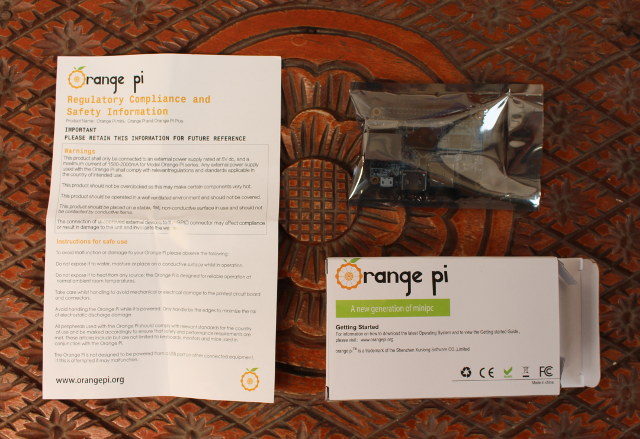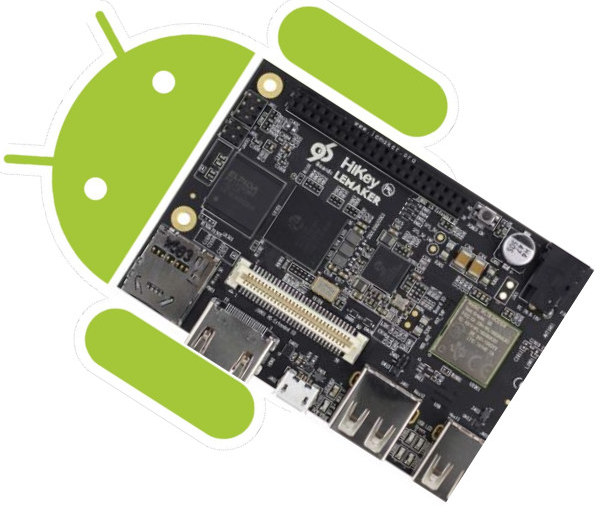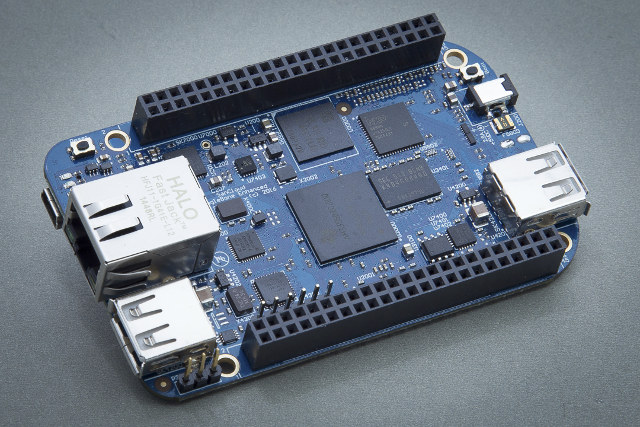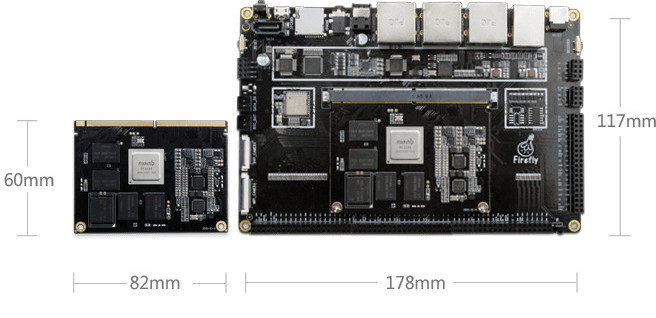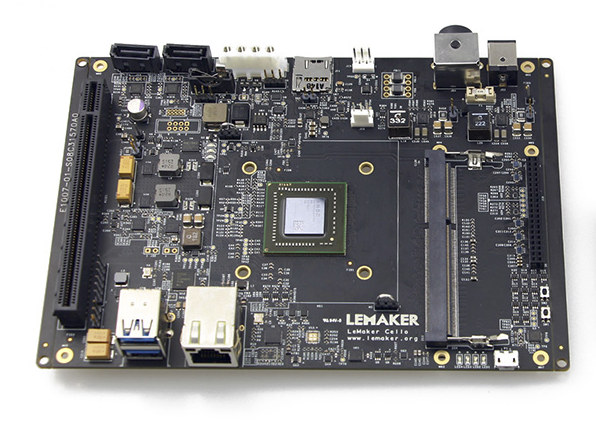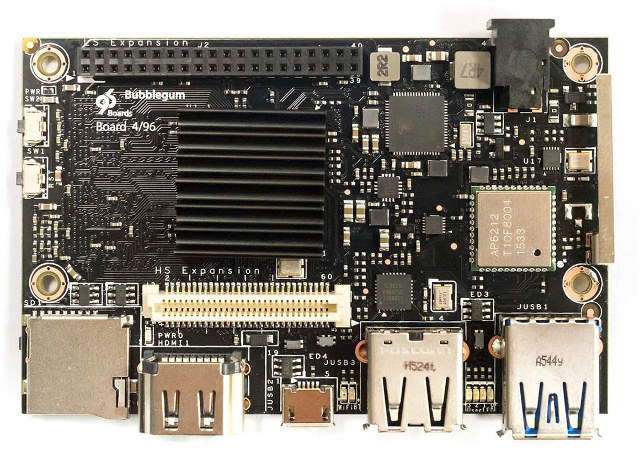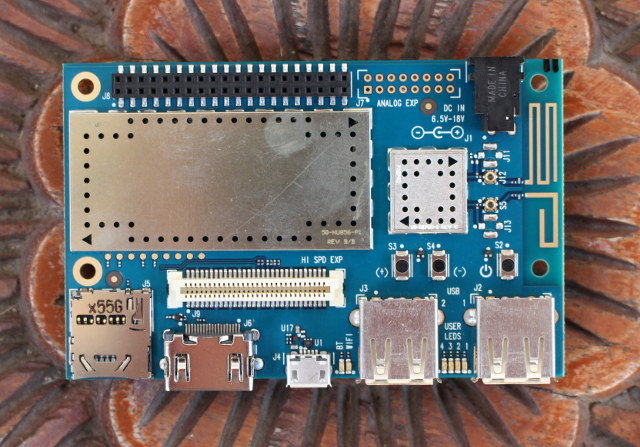Orange Pi One board is the most cost-effective development board available on the market today, so I decided to purchase one sample on Aliexpress to try out the firmware, which has not always been perfect simply because Shenzhen Xunlong focuses on hardware design and manufacturing, and spends little time on software development to keep costs low, so the latter mostly relies on the community. Recently, armbian has become popular operating systems for Linux ARM platform in recent months, so I’ve decided to write a getting started guide for Orange Pi One using a Debian Desktop image released by armbian community. Orange Pi One Unboxing But let’s start by checking out what I received. The Orange Pi One board is kept in an anti-static bag, and comes with a Regulatory Compliance and Safety Information sheet, but no guide, as instead the company simply asks users to visit www.orangepi.org to access information […]
96Boards Hikey Development Board is Now Officially Supported in AOSP
Hikey is a one of the first 96Boards compliant development board manufactured by either LeMaker in China and CircuitCo in the US, and while the hardware requirements of 96Boards specifications are rather easy to meet, the software requirements including “bootloader (open source), accelerated graphics support (binary or open source), a Linux kernel buildable from source code based from mainline, or the latest Google-supported Android kernel version” are much harder to comply with. Linaro had a very good news for Linaro Connect Bangkok as they announced Hikey board was supported in Android Open Source Project (AOSP). So that means Hikey board will run the latest version of Android like Google Nexus devices, with the advantage of also getting more recent devices. If you want to build an Android image from AOSP just retrieve the source code:
|
1 2 |
repo init -u https://android.googlesource.com/platform/manifest repo sync -j8 |
Grab & extract vendors binaries for Hikey from Google.com. and complete the build:
|
1 2 3 |
source build/envsetup.sh lunch hikey-userdebug make -j8 droidcore |
[…]
BeagleBone Enhanced Adds Gigabit Ethernet, More Memory & USB Ports, and Sensors (Crowdfunding)
It’s nice to see BeagleBone Black‘s open source hardware being leveraged by third parties, as we’ve already seen designs such as BeagleBone Green and BeagleBone Black Industrial 4G in the past, and now UK based SanCloud has decided to launch BeagleBone Enhanced on Indiegogo (flexible funding). BeagleBone Enhanced board specifications with bold highlights showing improvements over the BeagleBone Black Rev. C: SoC – Texas Instruments Sitara AM3358 Cortex A8 @ 1 GHz + PowerVR SGX530 GPU System Memory – 1GB DDR3 RAM @ 800 MHz Storage – 4GB eMMC flash + micro SD slot, optional 1MB SPI NOR flash USB – 2x USB 2.0 host port (A type), mini USB OTG port, 2x USB interfaces via expansion header Serial Port – UART0 via 3.3V TTL header Ethernet – Gigabit Ethernet Video Output – micro HDMI with EDID support, up to 1280×1024 resolution. Audio Output – Via HDMI Sensors Optional 6 […]
Firefly-RK3288 Reload Board Features a SoM + Baseboard Design, Supports SATA, Three HDMI Ports, and More
Firefly-RK3288 was one the first boards powered by Rockchip RK3288 quad core Cortex A17 processor, and now Firefly team, part of T-Chip technology, has provided a new version called Firefly-RK3288 Reload with the same processor, but more features, and thanks to design comprised of a carrier board and system-on-module (SoM) – connected via an MXM connector – suitable to people or companies wanting to create their own board without handing the complexity of the processor, memory, and storage part. The table below shows Firefly-RK3288 and Firefly RK3288 Reload specifications side-by side. Parameter Firefly-RK3288 (Plus) Firefly-RK3288 Reload SoC Rockchip RK3288 ARM Cortex-A17 quad core processor up to 1.8GHz with ARM Mali-T760 MP4 GPU RAM 2GB Dual-Channel DDR3 (Plus version is 4GB) 2GB Dual-Channel DDR3 Storage 16GB eMMC (Plus version is 32GB) MicroSD (TF) Card Slot 16GB eMMC MicroSD (TF) Card Slot SATA 2.0 (Suggest 2.5 inch SSD or HDD) PMU ACT8846 […]
LeMaker Cello 96Boards EE Board Powered by AMD Opteron A1120 Processor Targets Server Applications
There are two versions of Linaro’s 96Boards specifications the Consumer Edition (CE) and the Enterprise Edition (EE) with higher hardware requirements, and while several boards mostly compliant with 96Boards CE are available such as DragonBoard 410c and Hikey boards, the only board announced to be compliant with 96Boards EE specifications was AMD Huskyboard based on Opteron A1100 series processor and is yet to be available for sale. LeMaker has now designed a similar EE boards called Cello. LeMaker Cello board specifications: Processor – AMD Opteron A1120 quad core Cortex A57 processor @ 1.7 GHz with 2MB L2 cache, 8MB L3 cache System Memory – 2x DDR3 SO-DIMM sockets Storage – 2x SATA 3.0 ports, micro SD slot Connectivity – 1x Gigabit Ethernet RJ45 port USB – 2x USB 3.0 ports Expansions x16 PCIe G3 slot 40-pin Low Speed (LE) expansion header Debugging – micro USB port for console access, 10-pin […]
$89 Bubblegum-96 96Boards Development Board is Powered by Actions Semi S900 64-Bit Processor with 2GB RAM
Bubblegum-96 development board was unveiled nearly a year ago, and finally the Actions Semi S900 quad core Cortex A53 board compliant with Linaro’s 96Boards specifications will soon go on sale for $89. Most 96Boards development boards take a while to come to market, likely due to the software requirements. uCRobotics Bubblegum-96 specifications: SoC – Actions Semi S900 quad core Cortex A53 @ up to 1.8 GHz with PowerVR G6230 GPU @ 600 MHz System Memory – 2GB LPDDR3 @ 800 MHz Storage – 8 GB eMMC 4.5 flash + micro SD v3.0 socket Video Output – HDMI 1.4 with HDCP up to 4K, MHL 2.1 up to 4K via USB connector Connectivity – Wi-Fi 802.11 b/g/n, Bluetooth 4.0 USB – 1x USB 2.0 port, 1x USB 3.0 port, 1x micro USB 2.0 port Expansion 40-pin LS (Low Speed) Expansion connector – UART, I2C, 12x GPIOs, SPI, PCM, 1.8V, +5V, GND… […]
Embedded Linux Conference 2016 and OpenIoT Summit 2016 Schedule
The Embedded Linux Conference 2016 and the OpenIoT summit 2016 will take place on April 4 – 6, 2016 in San Diego, California, and over 800 attended will meet including kernel & system developers, userspace developers, and product vendors. The Linux Foundation has recently published the schedule, so I’ve had a look at some of the talks, and designed my own virtual schedule to find out more the current development focus although I won’t attend. Monday April 4 10:40am – 11:30am – Linux Connectivity for IoT by Marcel Holtmann, Intel OTC There are many connectivity solutions that available for IoT. For example Bluetooth Low Energy, 802.15.4, Zigbee, OIC, Thread and others. This presentation will provide and overview of the existing technology and upcoming standard and how they tie into the Linux kernel and its ecosystem. 11:40 – 12:30 – BoF: kernelci.org: A Million Kernel Boots and Counting by Kevin Hilman, […]
Free and Discounted Development Boards: Raspberry Pi 3, DragonBoard 410c, LinkIt ONE and More
Based on the number of comments I get when I organize giveaways, I think people like freebies. I don’t have anything to give away today, but others have launched competitions to win free developments, and Seeed Studio is having a promotional event with some discount on IoT boards. DragonBoard 410c Boards “Maker Month Contest” Qualcomm has declared March as Maker Month, and is asking developer to tell them what they’d make with a DragonBoard 410c board for a chance to win the board and up to $5,000. All you have to do is to submit your idea on DragonBoardContest.com, and every week, the company will give 7 to 10 boards (31 boards in total) to the people with the best ideas as selected by popular vote. The contest has two part: Part 1 – Submit your idea as mentioned above – Open between March 1 and March 31, is open […]


